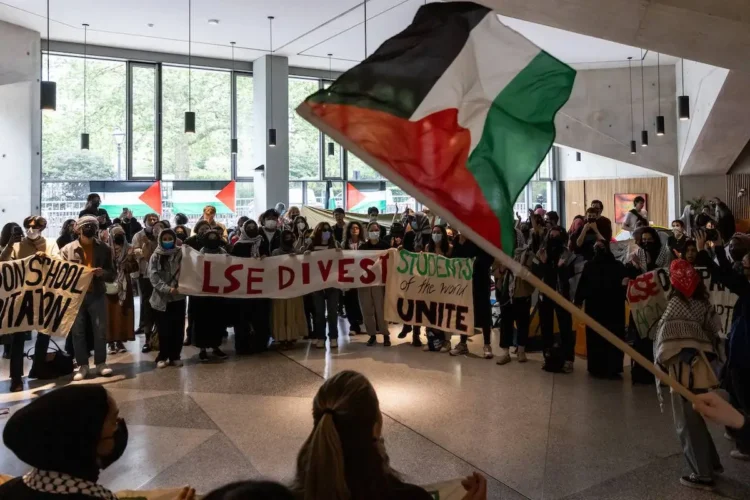By Gavin Mackintosh-
In a powerful display of student activism, the London School of Economics Students’ Union (LSESU) has overwhelmingly voted in favour of pushing for the university to divest from fossil fuels and weapons, including indirect investments.
This significant move reflects a growing demand for ethical investment practices within academic institutions, but is also a reflection of their collective stance against Israel in the war with Palestine.
The referendum, held on Tuesday, saw an unprecedented turnout with 2,584 votes cast. An overwhelming 89% of the votes, amounting to 2,306, were in favour of the motion. This mandate compels the LSESU to engage in dialogue with LSE senior leadership, advocating for comprehensive divestment from fossil fuels and weapons.
University students in both the UK and U.S have recently mounted protests in support of Palestine because of a deeply entrenched view among students and in many circles that the West is unfairly favouring Israel against Palestine.
The Israel Palestine war is complex, and the political allegiance of the West is towards Israel.
Britain took control of the area known as Palestine following the defeat of the Ottoman Empire, which ruled that part of the Middle East, in World War One after a Jewish minority and Arab majority took over the land.
Tensions between the two peoples grew when the international community gave the UK the task of establishing a “national home” in Palestine for Jewish people.
The Balfour Declaration of 1917 was a pledge made by then Foreign Secretary Arthur Balfour to Britain’s Jewish community which was a British mandate over Palestine and endorsed by the newly-created League of Nations – forerunner of the United Nations – in 1922.
The latest vote comes amid heightened student activism at LSE, where pro-Palestinian students have set up tents on campus to protest the university’s ties with Israel. The activists are calling for an end to LSE’s alleged complicity in what they describe as the genocide of the Palestinian people, the arms trade, and climate breakdown.
Ethan Chua, a member of the LSE Students’ Union Palestine Society told The Eye Of Media.Com: The reason we are calling for divestment because most well informed students strongly object to a university that is materially complicit in the destruction of our planet and the death of Palestinians. A lot of students are occupying a university building and will not leave until our demands are met.
With the motion now officially adopted, Sabbatical Officers will lead efforts to engage with the university’s senior leadership. Their goal is to ensure that LSE’s investment portfolio aligns with the values and priorities of its student body, promoting greater transparency and accountability in financial decisions.
The LSESU’s call for divestment is part of a broader trend of student activism across the UK. Similar protests have erupted at other institutions, including SOAS and UCL, where students are demanding their universities sever ties with entities that support Israel’s actions in Gaza.
The push for divestment from fossil fuels and weapons aligns with a growing global movement advocating for ethical investment practices. Universities, as influential institutions, are being urged to reconsider their financial ties to industries that contribute to environmental degradation and conflict.
LSE students’ call for divestment is also a reflection of broader societal concerns about climate change and human rights abuses.
Students are pushing for their university to take a stand on critical global issues and align its financial practices with ethical and sustainable values.
A statement from the London School Of Economics to The Eye Of Media.Com read:
‘On 14 May 2024, following a rally on the LSE campus, some protestors entered and occupied part of the ground floor of the LSE Marshall Building, highlighting a range of demands relating to investments. On 4 June 2024, the LSE Students’ Union voted for in favour of the School divesting.
“LSE has been engaging in dialogue with the protesters and its student body on these issues. Our priority continues to be the wellbeing of the LSE community.”
“LSE is committed to strengthening our approach to responsible investment in line with our Environmental, Social and Governance Policy, which was adopted in 2022 with the aid of student input.
“This policy includes LSE not making direct or, as far as possible, indirect investments in companies engaged in tobacco manufacture or indiscriminate arms manufacture. It also seeks to eliminate direct investments, and greatly reduce exposure of indirect investments, to the worst polluting fossil fuels.”




